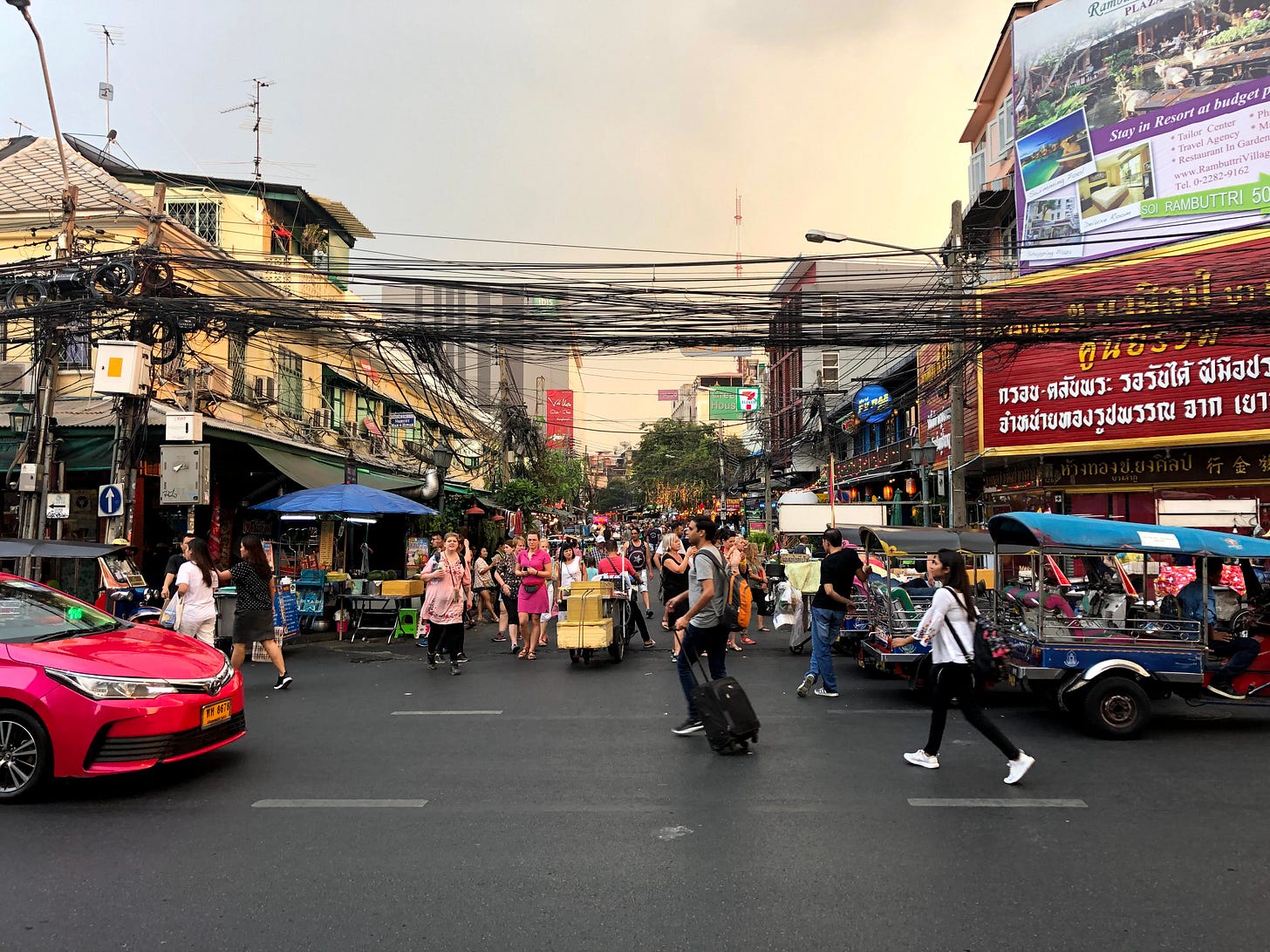
Bangkok, present day
In the last newsletter of 2019 I started to talk about the dizzying scale of climate change and the algorithms that scatter the information we exchange and how they’ve broken the way we experience time. A good corollary to that is the fact that the way we experience the future also seems to be broken.
What better person to ease us into this topic than William Gibson, one of my favorite writers since I was a teen reading Burning Chrome and listening to Nine Inch Nails. I went to see him, William Gibson that is, in Cambridge this week as I always try to do when he has a new book out. He was recounting how he was just about finished with a semi-contemporary novel as the 2016 election happened. He found himself plunged into professional crisis as he realized his entire manuscript suddenly existed in an irrelevant reality, a timeline that had basically hit a dead end and collapsed.
While Gibson is cast as a futurist, he cycles between writing in a slightly off-kilter present, the near future, and the distant future, and insists that in all cases he’s using these timelines merely as tools for understanding the present moment. So Neuromancer was less about cyberspace and more about corporate globalization in the 80s. Post-election, he found the timeline he had been using was broken. Suddenly, his new book was irrelevant, because as he put it, the post-2016 world had become “so stupid he often thought he must be dreaming.” And every week it seemed to get stupider than the week before. How does a science fiction author write something that can keep up with a world in such turmoil?
He did find a clever solution after much agonizing, and spoke recently with New York Times columnist Michelle Goldberg about the implications of that creative dilemma, which she calls a “darkness where the future used to be.” Gibson’s books have always been fairly dark, but he used to consider himself an optimist, stating in one essay about the never-arriving apocalypse, that history never stops happening. “Since the end of the Cold War, I’ve prided myself on being the guy who says, eh, don’t worry, it’s not going to happen tomorrow,” he told Goldberg. “And now I’ve lost that.”
Increasingly, it feels like we don’t know how to envision what’s to come. Gibson recalls how in the 20th century, we constantly referenced the 21st century with a kind of glee, and that doesn’t happen anymore. “We don’t seem to have, culturally, a sense of futurism that way anymore. It sort of evaporated.”
In my own mind, I do find I have a hard time picturing beyond 30 years or so. The possibilities of where the world could be at that point seem so radically divergent depending on what happens in the next 10 years that it’s just kind of a cloud. But I have to admit I would generally not describe that cloud as a happy place.
David Wallace-Wells once wrote, about the difficult decision to have children:
Take any chunk of nine months over the last decade and the picture of climate change is sure to have darkened in that time. Take any chunk of nine months in the future and the same is likely to be true. Extend the chunk of time to the length of a childhood, or a full life, and that picture of climate suffering gets dramatically worse.
The optimism or pessimism with which we view the future has been a source of great debate in climate communications. For many years, based on I don’t know some communications professor’s article, people got it in their heads that we like optimism more than pessimism so you have to shroud the warning of climate change in hope. As a result, we’ve been sugar-coating it for years. Wallace-Wells’ Uninhabitable Earth article and then book were a quite effective effort to counter that.
I tend to be of the opinion that the relentless attempts at positive messaging were indeed a disservice. But there is something to be said for needing to imagine a better future. I just listened to an Ezra Klein interview (I know I’m always talking about that podcast) with Saul Griffith in which he talks about how decarbonization is hard, but it’s totally possible and we’ve done big things like it before but nobody ever talks about it that way. And it can actually make our lives better. What I like about Griffith is that he’s also very realistic about the difficulty, that it will take huge government mobilization, not just market forces, and we have a limited window to do so before certain irreversible tipping points.
One main objection to the case for optimism is that it’s often focused solely on technology. As Michelle Goldberg points out in her column, people are not only no longer optimistic about technology the way we once were, it’s actually become a source of horror. We keep seeing how tech seems to make things better at first, then ruins everything. So any credible envisioning of a better future has got to include new realities of social and economic structures, along with physical infrastructure. (See more on this here: Imaginable Worlds, and Eric Holthaus recently wrote a great example of it here.)
There are authors out there trying to fill in the black void ahead.
Paolo Bacigalupi’s The Water Knife is a book that I found flawed, but I do sometimes recommend because it has this vivid vision of an apocalyptic Phoenix (where I grew up) and some gut-wrenching worst-case scenarios of how we’ll treat each other during climate crisis. But one of the issues I have with it is that I find it leans a little too heavily on the everyday misery of his characters.
By contrast, in his novel Blackfish City, Sam J. Miller is a master of depicting a violent dystopia that is nevertheless a really cool place to live sometimes, where people are often just kind of doing their thing and eating really good noodles. One of my favorite little moments happens randomly at the end of a very serious conversation:
“Thanks, Grandfather. Oh, look!”
Two sea lions barked and bumped chests. Both men laughed.
Octavia Butler’s excellent Earthseed books are on trend these days, because they are cathartically bleak stories of a near future in ways that seem extremely plausible or even accurate to the present day US. They are very, very dark. But Butler’s books do have touching relationships and communities, and her Earthseed philosophy poses a way to live in peace with chaos and trauma. The series was supposed to end with the characters starting new communities on other planets, but Butler struggled with the final book and didn’t finish before she passed away in 2006.
In Jennifer Egan’s A Visit from the Goon Squad, climate change unfolds quietly in the background of her interconnected characters’ lives over the decades. She almost offhandedly describes the sea wall barricading off part of Manhattan, water shortages and altered seasons, and solar panels that collect energy from the moon at night, all while characters live out the drama of their lives.
I’m still ambivalent about how optimistic or pessimistic we ought to try to be about our future. The answer is probably neither and both, as Cheryl Strayed says, that “two things can be true at once.” This is well put by Mary Annaïse Heglar in her essay, “Home is Always Worth It,” in which she criticizes both “doomer dudes” and those demanding a hopeful tone.
We don’t have to be pollyannish, or fatalistic. We can just be human. We can be messy, imperfect, contradictory, broken. We can recognize that “hopelessness” does not mean “helplessness.”
…
We don’t know how this movie is going to end, because we’re in the writers room right now. We’re making the decisions right now. Walking out is not an option. We don’t get to give up.
That’s all of our jobs now, activists, writers, people making decisions at their kitchen tables—to fill in that void ahead. We have to imagine what kind of world we want to build, even while it’s on fire. It won’t be ever-warring doom or a utopia of innovation, but it has to be something.
Links:
We all know plastic waste is very bad, but petrochemical plants generate enormous GHG emissions. “Plastic is fossil fuel in another form.”
Baby boomers are basically living in a form of socialism, but remain deeply opposed to others experiencing it. Meanwhile, the path to adulthood looks bleak for young people.
Market Street in SF is car free. “Today represents the way the world is finally changing how it thinks about the role of transportation in cities.”
Jon Stewart’s 2010 rally was a low point of denial about common ground with an unhinged right.
The Guardian will no longer accept fossil fuel advertising. (Meanwhile, the Post and NY Times are producing ads for oil companies.)
If, like me, you do not get the whole Andrew Yang thing, this article does a very good job of explaining it.
If, like me, you do not get the whole Tyler the Creator thing, this article does a very good job of explaining it (although you probably still will not like him).
Judges keep trying to block DA Rachael Rollins’ agenda. Still, Rollins wiped out a larceny conviction of an immigrant who was facing deportation because of it. “Justice won today.”
Understanding Fossil Fuel Divestment
You can still access a two-part series I wrote about fossil fuel divestment, answering why major foundations are still invested in oil and gas, and why divestment is such a critical issue.
Major Climate Funders Are Still Invested in Fossil Fuels. Why is That?
Ellen Dorsey of Wallace Global says, “There is a whole thing around how entrenched modern portfolio theory is, and how the investment professionals have a vested interest in retaining control. So they're going to fight. They become part of the opposition to it.”
As Top Foundations Resist Divesting from Fossil Fuels, What Might Change Their Minds?
“It is unconscionable and immoral to support the industry that is burning down the planet,” says Clara Vondrich, director of Divest Invest. “So, yes, it is a litmus test for real climate commitment, particularly given that there’s a false choice between returns and divestment.”


Reading
I’ve been wanting to read this one for a long time I’m currently in the middle of Erica Chenoweth’s Why Civil Resistance Works, a highly influential book for climate activists like Sunrise Movement and Extinction Rebellion, but also animal rights activists groups like Direct Action Everywhere. It’s the result of a study that looked at resistance campaigns from 1900 and 2006 and found that nonviolent campaigns were nearly twice as likely as violent campaigns to be successful.
“Moreover, we find that the transitions that occur in the wake of successful nonviolent resistance movements create much more durable and internally peaceful democracies than transitions provoked by violent insurgencies.”
Watching
Sex Education is a little on the crude side, but more than anything, it’s a show with an enormous heart. I think part of the charm is that it takes place floating free from location and time, in an imaginary rural England / American high school fantasy land where teens play Harry Nilsson at their parties and have deep conversations about body image and consent. Sort of like Spider-Verse did for superheroes, Sex Education attempts to heal the troubled past of the teen comedy genre and it is also very funny.
Buying
I have a real bag addiction I just love things that carry things and I have way too many backpacks, etc. It’s almost certainly rooted in some deep control issues, but anyhoo we don’t have to go down that road. The best bag I own right now is the Lo & Sons Hanover Deluxe 2. It sounds fancy, but it is a unisex, plain matte black backpack, holds its shape, has a removable internal organizer in case you want to use it just for clothes, and the right number of little pockets.

Best of all, and this just never happens—it has zero branding. You will not find a company name or logo anywhere on the bag. not even on the zipper pulls. It is an artifact from a William Gibson novel, come to life. This is it.
That’s what I got this week. I’m starting up an obnoxious new hobby which is a thing I do sometimes. Once I told my friend Swedlund that I needed a hobby and he said you have like five hobbies what are you talking about. So this one is pickling things which I swear is not some kid of apocalyptic survival project. I just like pickled vegetables but I like them only in a really specific way so I’m going to try to make them. I have all these packages showing up, kitchen scales and digital thermometers like I’m Walter White or something and the other day Jamie texted me you got your pickle packages and I responded with this which she thought was pretty funny.

I’ll let you know how the pickles go maybe I’ll do a competition where the winner gets a jar of pickles because I have a feeling I’m going to have way too many pickles before long. So stay tuned if for no other reason than the chance to win some pickles. Stop saying pickles.
Tate


